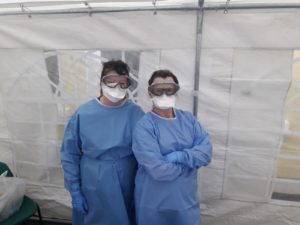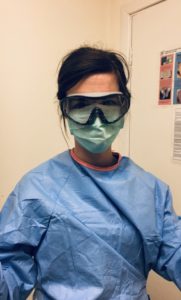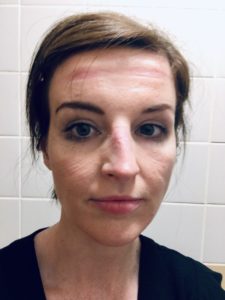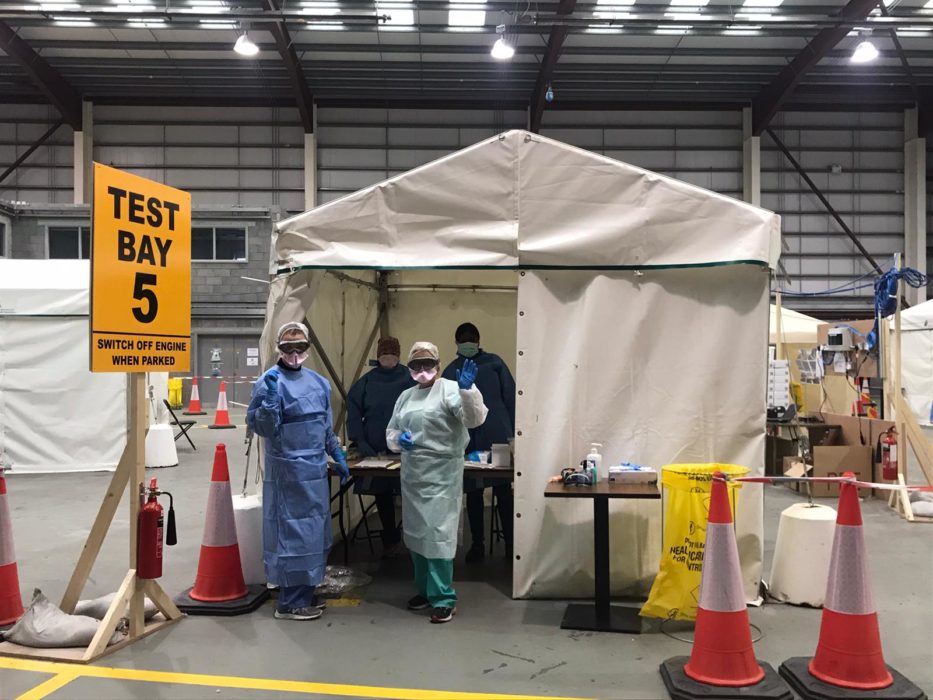Guest blog: SLTs and the Covid response
Noritte Gallagher is a senior speech and language therapist (SLT) based in Galway PCCC. She works in a department with 54 other people, the vast majority of whom were redeployed during the Covid-19 crisis. Noritte herself was not redeployed as she’s in a vulnerable category, and has been delivering a remote service to her patients from home. However, she said no matter what job the SLTs in her team have found themselves doing since the onset of the crisis, they have gone above and beyond the call of duty adapting to this ‘new normal’ with the service constantly evolving.
Pictured above is blog contributor Caroline McLoughlin and her SLT colleagues at the Galway Airport Covid-19 testing site.
Above and beyond
Aerosol generating procedures such as speech and swallow assessments which involve the stimulation of coughing were all halted immediately as these practises are exactly how Covid is transmitted . Everyone was quite nervous about going to meet people in the first six weeks of lockdown, but they’ve gained confidence now and settled into this new reality, for the most part.
Adults and medically vulnerable children can now be seen for swallow assessments with SLTs in full PPE (personal protective equipment) for home visits if absolutely necessary, while referrals have to be triaged. Person–to-person contact is kept to a minimum at all times so a lot of information exchange is being carried out over the phone.
As all SLT services had to immediately cease at the beginning of the crisis, we quickly adapted to safely meet the needs of our clients. A huge number of resources, mainly for the paediatric population, came on stream and several SLT websites across the world began sharing their materials for free. We altered and refined these resources for use with our specific caseloads and some local SLTs also made their own videos for clients to help explain what they needed to do in order to continue their therapy programs.
As I’m working from home I don’t have access to all the materials in my office. Everything has to be so well planned in advance in case I need a particular tool or prop for an online session I’m delivering. In this event my husband will collect it from my office. I miss having access to the clinic but I’ve continued to work with my patients over WhatsApp and Zoom, and more recently using the ‘Attend Anywhere’ programme rolled out by the HSE.
In speaking to my colleagues it came to my attention how different each one of our experiences have been - all united by the same goal of trying to overcome this crisis by working together.
In speaking to my colleagues it came to my attention how different each one of our experiences have been – all united by the same goal of trying to overcome this crisis by working together. I thought it fitting to not only outline how my work has changed, but to invite others to share their stories and truly demonstrate the diversity of the profession, while also highlighting the incredible personal effort of each SLT.
Noritte Gallagher, senior SLT, Galway PCCC.
‘So shines a good deed in a weary world’

Caroline McLoughlin and her colleague Patricia Collins at the Galway Airport Covid-19 testing site.
I usually work in primary care with both adults and children, but since the start of the pandemic I have been redeployed part-time as a Covid-19 tester and have worked in community and nursing home testing in Galway. Direct face-to-face work with children has stopped completely but I have continued to see high priority clients in the adults service while wearing full PPE, and provide support remotely to parents, public health nurses, teachers, carers and clients. I have used WhatsApp video as an assessment tool and have also created videos on YouTube to share with clients and carers on how to thicken fluids correctly. Many people are suffering with their mental health in the current situation and I have found that the counselling in primary care (CIPC) phone service is a great resource for clients and carers.
Currently I’m trialling ‘Attend Anywhere’ software which will allow for greater remote provision of services and I’m trying to triage the caseload. SLT practice is already changing and I am looking forward to a time when we can see all clients again safely and do the job that we have been trained to do.
Personally the biggest challenge during the pandemic has been the loss of my beloved friend and SLT colleague Sorcha who suffered a catastrophic stroke in May and later died in June. I had trained with Sorcha and it was very hard not being able to visit her in hospital and say goodbye or to attend her funeral mass. But we were able to form a guard of honour and stand outside the church. My thoughts are with all who have suffered bereavement during this terrible time. However, despite all the sadness and worry, the kindness of those around me has been amazing. As Willie Wonka said: “So shines a good deed in a weary world.”
Caroline McLoughlin, SLT, Ballinasloe Health Centre
The person behind the mask


“Taken following a day of mobile swabbing at the local nursing unit. Anyone who has worn an FFP2 mask and goggles for a prolonged period will recognise these marks.” – Aoife Carolan, SLT
I have to admit I was reluctant to write this reflection as so many HSE workers have done exceptional pieces of work as part of the Covid-19 response and I don’t feel my story is in any way special. But perhaps it will demonstrate the role of ‘on the ground’ Community SLTs during this pandemic. It has been an honour to be part of the response and empowering in many ways to help, as a member of a caring, skilled profession.
SLT provision during this pandemic could not stop for our priority-one cases in adult and paediatric services. However, our methods of service delivery were required to evolve at rapid speed. Tremendous research, planning, tweaking and organising was done to upskill around what safety control measures were immediately needed to allow us help our clients in a safe, equitable and productive way.
SLTs embraced the opportunity of upskilling for example, with telepractice, and an immense amount of work has been done to facilitate its set up as a safe option for clients and families for whom it is deemed to be a suitable medium of service delivery. Language class meetings and aids and appliances committees continued to meet virtually during lock down, meaning that the needs of clients with severe communication difficulties continued to be addressed. Online training programmes were developed and our clinical teletherapy skills were honed. New policies that would typically take months to produce and sign off on were written under huge time pressure, with great team effort and spirit. Sharing of new, relevant documents created between departments was one example of the helpful attitude demonstrated by allied health professionals (AHPs) and the strong sense of teamwork which enhanced our response times.
Each therapist put their shoulder to the wheel using our unique clinical experience and skill sets to contribute towards the Covid effort, whilst also maintaining crucial SLT services
Each therapist put their shoulder to the wheel using our unique clinical experience and skill sets to contribute towards the Covid effort, whilst also maintaining crucial SLT services. This meant juggling SLT clinical work with swabbing shifts for most of us. The team dynamic changed; Some colleagues were redeployed full time to assessment hubs while others upskilled so they could become trainers for colleagues on safe usage of PPE. Days were spent in residential care sites doing urgent swallow assessments, communication rehabilitation and assisting the team involved in ‘mobile swabbing’ in residential care sites. Other mobile swabbing venues included meat factories and halting sites. It felt as though we were constantly ‘on call’ waiting to be advised if we would be swabbing, and at what location and what time. Many colleagues continue to juggle these roles.
Working as an SLT during a pandemic is tiring. Not only do we need to consider the highly complex presenting clinical variables, but an entire level of parallel problem solving is required surrounding risk management also. For example, our clients with dysphagia cannot wear a mask during an assessment and physical distancing during examinations is often not possible. Working in PPE for long periods is tough too. The image above was taken after a long day on a mobile swabbing team at a local nursing home. My own mother told me that I look unrecognisable! I think it’s important for others to take a moment and consider the person behind the mask.
The silver lining in all of this has been to witness the ‘can do’ attitude of SLTs and our health and social care professional (HSCP) colleagues. There is a true sense of achievement in doing something positive to help the ‘Covid cause’ along with the increased sense of team spirit amongst AHPs from various backgrounds and experience levels – with each of us adding something unique and beneficial to the piece of work required. I feel privileged to be working and helping others during a time we will never forget and one that will change us and our practice forever.
Aoife Carolan, Senior Community SLT, Laois/Offaly
Improvement for the future
Since Covid, I have been redeployed to contact tracing. I’m mainly completing call-ones which involves contacting the person who was recently tested and letting them know they got a positive result. Once the person has had time to process this, we collect information about their onset of symptoms, what type of symptoms they had, whether they needed to be hospitalised and their current presentation. We also gather information on whether or not they have any underlying health conditions. This allows us to learn more about the virus and how it presents in different groups. We then give information on how to self-isolate and advise how to prepare their list of close contacts which will be the next call. Then finally we give information on what to do if symptoms worsen.
In the early stages it was a little overwhelming and stressful due to fear of the unknown and trying to become familiar with the call scripts and the information. The days could be tiring due to long shifts working on the phone, computer and extra travel due to redeployment. Sometimes my voice was tired and hoarse at the end of the day.
There were emotional and draining times, trying to reassure families who already had very sick relatives when you were giving the person on the phone a Covid diagnosis. Other days were more reassuring where the people you were contacting had milder symptoms or were nearly completely recovered.
There were emotional and draining times too, trying to reassure families who already had very sick relatives with Covid when you were giving the person on the phone a diagnosis. Other days were more reassuring where the people you were contacting had milder symptoms or were nearly completely recovered. It could be lonely at times due to staggered work shifts and not always being rostered on with direct colleagues, but I was very fortunate that the centres I was redeployed to (GMIT and more recently NUIG) had lovely, very welcoming and inclusive staff. It was nice to get to know other people from different disciplines who were sharing the same experience.
The pandemic has really shown me how adaptable we can be. SLTs have a skill set that is transferable to other areas such as trying to comfort a frightened person on the phone who has just been diagnosed with Covid or reassuring and comforting someone about to be tested.
However, I do really miss the personal side of my own clinical work like client contact and engaging in therapy. I forgot how much energy you get from working directly with families, but I also think that some positives will come from this and improve how we work in the future. For example, working with clients using telehealth phone calls, WhatsApp, Attend Anywhere software for when access to the clinic is not an option for a family due to travel, work, childcare etc. Above all else, this whole experience has really made me value and cherish the health, safety and wellbeing of my family, friends and colleagues.
Aisling Feery, Senior SLT, Ballinasloe Health Centre
Deep resilience
I am a Senior SLT based in Primary Care East Galway with a paediatric caseload. The Covid-19 pandemic has meant very significant personal and professional changes and challenges for me. I was redeployed quite quickly into Covid-19 testing services both assisting the National Ambulance Service with conducting testing in nursing homes in March and April and then in the Galway airport testing centre in May and June. This involved learning many new skills and procedures while working with personnel from across the health services.
My regular role as a clinic based paediatric SLT has been significantly impacted and we are at present adapting our service for remote delivery wherever possible, as for the past few months in-person services have been suspended. This includes becoming familiar with delivering sessions via telepractice/video call as well as collaborating with colleagues remotely. We are also evaluating how we can safely return to delivering in-person services where required.
On a personal level, there have been significant additional challenges being the parent of two young children aged two and seven. With both parents still working, continuing school work from home and keeping the children stimulated and entertained without the usual family activities, childcare and educational supports has been difficult.
It has been a time of unprecedented personal and professional challenges but the benefit has been that SLTs have discovered deep resilience and transferrable skills and competencies.
Overall it has been a time of unprecedented personal and professional challenges but the benefit has been that SLTs have discovered deep resilience and transferrable skills and competencies. I believe the provision of SLT services will be irrevocably changed by this pandemic and we will be called upon as never before to be innovative and flexible in how we deliver services and meet client needs.
Katherine Creane, senior SLT, Athenry
Steep learning curve
Regular paediatric SLT work has continued, however it has changed considerably . SLTs in clinics have continued trying to keep things going while also adapting to a very different scenario. Work has involved responding to queries by telephone or email, checking in with existing clients, sifting through new referrals trying to identify priority referrals etc.
A whole new skill set is evolving and a steep learning curve is required. Time is being spent grappling with learning how to use and incorporate the new Attend Anywhere software so we can do virtual sessions in a professional and user friendly way. In addition to trying to adapt to and set in place the challenges of face to face contact which will be necessary for a certain cohort of clients where virtual sessions do not suffice.
Adapting to our new normal where everything is slower and requires serious consideration is a task in itself but we are up for the challenge.
Adapting to our new normal where everything is slower and requires serious consideration is a task in itself but we are up for the challenge.
Patricia O Connor, SSLT, Galway PCCC

